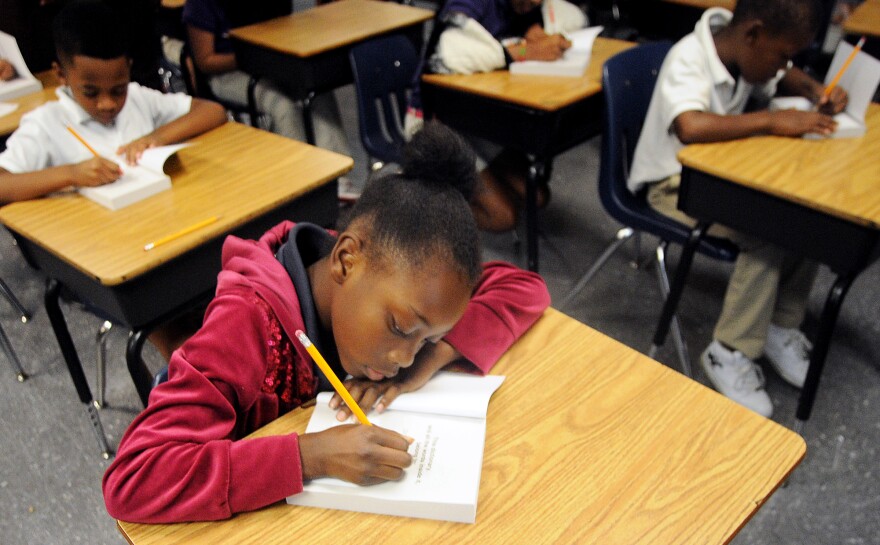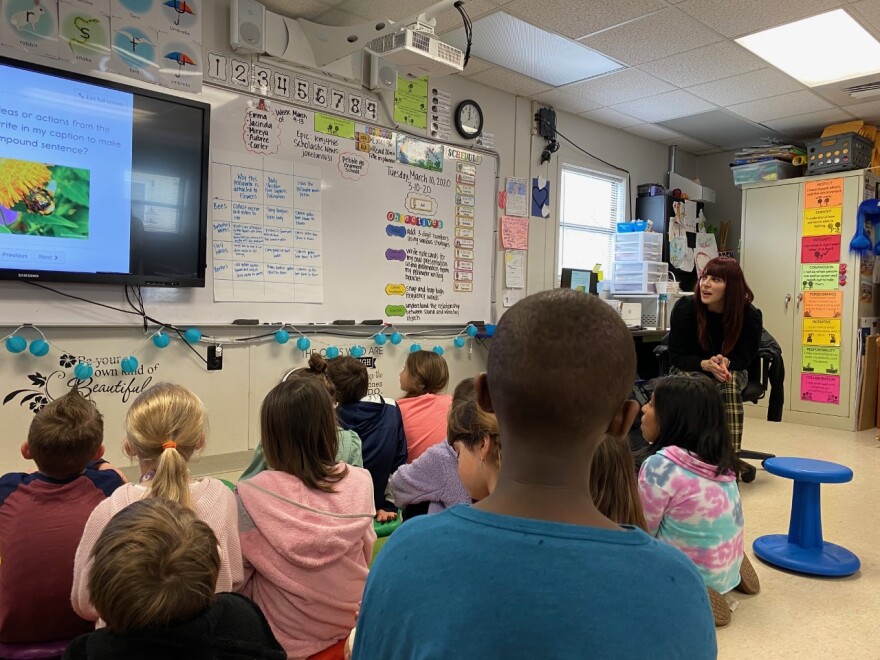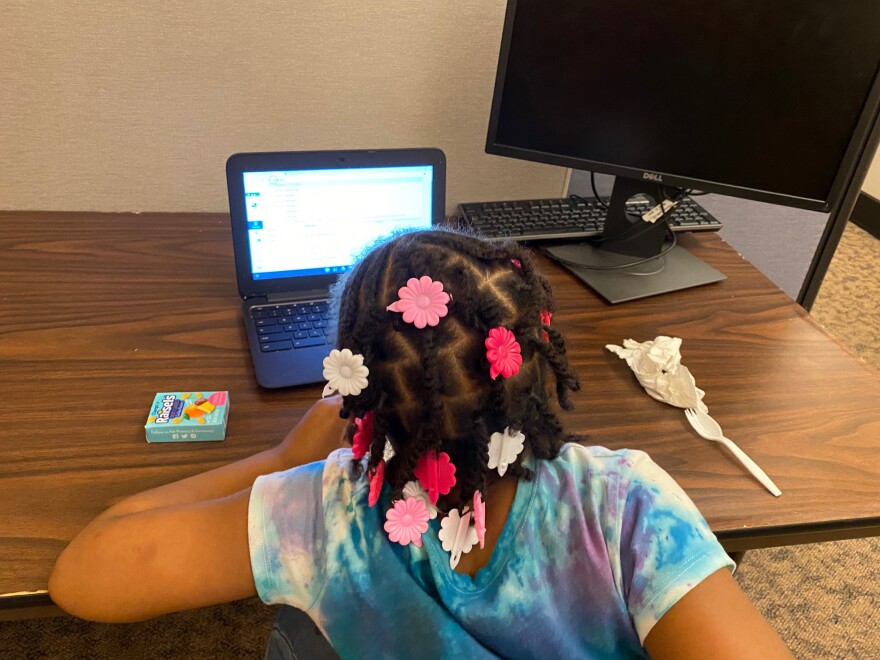North Carolina will elect a new superintendent of public education next week, with Democrat Jen Mangrum and Republican Catherine Truitt vying for a post with no incumbent.
It’s a job with limited power and a history of controversy. The General Assembly makes most of the decisions about public education, and the appointed state Board of Education carries out those decisions. Those bodies have wrangled with the last two elected superintendents over the scope of the superintendent’s authority — battles waged sometimes in court and sometimes in the legislature.
Truitt says she’s only half joking when she promises that if elected she won’t start her tenure with a lawsuit.
The superintendent has a seat on the Board of Education — and a voice in advising the governor as a member of the council of state. The office-holder also oversees the Department of Public Instruction, which has almost 960 employees and an annual budget of $130 million. And the visibility of the job gives the superintendent a forum for engaging with everyone who has a stake in public education — and a bully pulpit to push for change.
Common Ground And Sharp Differences
Truitt and Mangrum have some things in common. They’re both former K-12 teachers who now work in higher education. Both live in Wake County.
And both say they’ll have a smoother working relationship with the Board of Education than Mark Johnson, whose four-year term has been marked by clashes with that body.

Neither has held elected office, though Mangrum — who switched her registration from Republican to Democrat after the 2016 election — ran against Senate leader Phil Berger two years ago.
Mangrum acknowledges she doesn’t have strong relationships with the Republicans who hold power in the General Assembly, but says she’s built connections with legislative Democrats and hopes the Nov. 3 election will increase their numbers.
“I’m not afraid to communicate with Sen. Berger,” Mangrum said in a recent interview. “Whether or not we agree on things is indifferent to me. But I just think some things are worth fighting for.”
Mangrum is a professor of education at UNC Greensboro and describes herself as “a teacher through and through — I understand classrooms and I am representing teachers.”

Truitt was an education adviser to former Gov. Pat McCrory and worked with former UNC system President Margaret Spellings on crafting K-12 legislation. She’s currently chancellor of Western Governors University North Carolina, a nonprofit online university that works in partnership with the state.
“My career after the classroom has included a very wide variety of education experiences — everything from coaching nationally in high-poverty schools to working on education policy for a sitting governor. I have executive experience that my opponent does not have,” Truitt said in a recent interview.
Truitt says she’ll build strong connections with local superintendents and work to increase local control of education decisions, “because local leaders know best what resources are needed and who needs them most.”
The Reading Challenge
One of the biggest challenges to North Carolina’s public schools has been teaching students how to read. For the last eight years, the state’s Read To Achieve legislation has driven efforts to get students up to grade level by third grade. Both candidates agree Read To Achieve hasn’t worked – reading proficiency remains low, especially for low-income students and students of color.

Truitt calls those gaps “education malpractice, pure and simple.” She says SB 438, which called for summer reading camps and individual instruction plans for students who test below grade level, would have been a strong start on fixing the problem. But she noted that Gov. Roy Cooper vetoed that bill.
Truitt says she thinks the Board of Education is on the right path with efforts to focus on phonics-based education for young students.
“This issue boils down to the battle between whole-language and balanced literacy folks and phonics, which is also known as the science of reading,” she said.
Jen Mangrum wants to see Read To Achieve repealed. She wants to do less testing and less drilling on basic skills. She says she can bring top classroom teachers and university professors together to craft some better strategies to teach literacy — strategies that don’t take the joy out of learning.
“There is so much we can do around literacy and reading with the talent we have in North Carolina — if we give educators a voice,” Mangrum said. “Because we have a lot of educators who know what they’re doing and know how to teach reading really well.”
Building The Teaching Profession
In recent years a battle over teacher pay has raged between the Republican-led legislature and Democratic Gov. Cooper, who last year vetoed a raise he called skimpy. The superintendent has no power over pay, but both candidates have views on how to bolster the profession.

Truitt says one thing the superintendent can do is help prospective teachers understand that conditions in North Carolina are pretty good already. She says the General Assembly has been boosting pay steadily, though there’s still room for improvement.
“We are not losing teachers to other states in large numbers, and we actually need to do a better job of communicating teacher compensation. The teacher benefits package is actually worth about $16,000,” Truitt said, referring to the value that health insurance, retirement and other benefits add to the base salary.
Truitt would also like to make some significant changes to the pay structure. For instance, she wants to find a way to level out the competitive edge that counties with a strong tax base have when they pay a bigger local supplement. And she’d like to see the state give school districts a set dollar amount to hire teachers, rather than allocating positions based on enrollment. She says the current system gives an edge to schools and districts that can easily attract teachers with lots of experience, strong credentials and higher salaries — leaving others with a weaker faculty.
Truitt acknowledges those are changes the superintendent can’t make, and she says she doesn’t have a detailed plan for how to replace local pay supplements. Her role, she says, would be mobilizing officials who can make the change.
“These kinds of innovations are only going to occur if we are all rowing in the same direction, if someone is providing leadership that is about building consensus rather than grabbing power,” Truitt said.
Mangrum says the superintendent has to counter the idea that teaching is a thankless, low-paying job and make it attractive to top students. She says the way to do that is by expanding the state’s Teaching Fellows program, reducing their college debt and giving teachers more power to make classroom decisions. That could be things like reducing the emphasis on testing and test scores.
“What I can do is a lot of work around teacher autonomy, curriculum, strong professional development that’s led by teachers, for teachers,” Mangrum said.
“A lot of my job is to provide resources and to remove barriers for the districts,” Mangrum added, “because the General Assembly makes the laws and the state board makes the policies.”
Responding To The Pandemic
Cooper and state health officials have been calling the shots on closing schools and allowing students to return during the COVID-19 pandemic.

At this point, elementary students can return with minimal distancing, while older grades are required to keep a six-foot distance that requires rotating schedules in most districts. Districts and charter schools can choose a more restrictive plan, and most of the state’s students began the year in all-remote learning.
Both superintendent candidates say they’d use their advisory position to make suggestions moving forward.
Mangrum says she thinks the state is pushing to reopen too fast – and leaving school districts on their own to handle the details. She’d like to see the Department of Public Instruction produce instructional videos on handling the return of students and offer help with tracking and communicating COVID-19 cases.
“I think if there’s even one student in a school that has a case, we need to be able to communicate that, because parents need to know that before they send their children to school,” Mangrum said.
Catherine Truitt says if she’d had the governor’s ear in March she’d have told him to leave closing decisions to local districts. And moving forward, “I believe that the decision to reopen schools should be a local decision.”
Early voting continues this week through Oct. 31, and Nov. 3 is Election Day.
Tell us about your voting experience. Did it go smoothly? Were there any problems? How were the lines? Did you feel safe? If so, why or why not?
_



